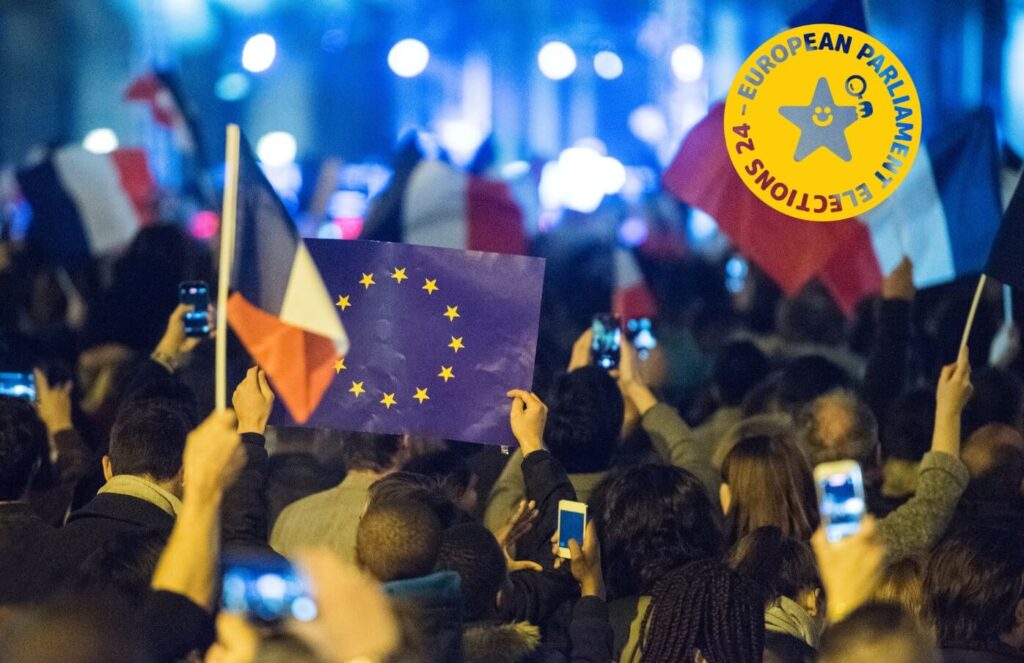
The election takes place in a context dominated by the defeat of the social movement of 2023, which deepens the traditional demobilisation of the working classes for such a ballot. In this framework, the right wing is expected to outperform the left wing and the far right to outperform the right.
The aftermath of the 2022 elections
The political situation in France has been very unstable since the legislative elections of June 2022, which saw the election of a National Assembly (the lower house) in which none of the parties could hold a majority, nor form a majoritarian coalition. In the second round of the election, the liberal coalition, Ensemble/Renaissance, which is also the party of the French President, Emmanuel Macron, won 246 seats (25,80 % of the votes in the first round); the left-wing coalition, the NUPES, won 142 seats (26,16 % in the first round); the main far-right party, the Rassemblement National, won 89 seats (16,68 % in the first round); and LR, the traditional right-wing party, won 64 seats (11,30 % in the first round). In addition to the groups corresponding to these parties and coalitions, a group of independent representatives (LIOT) won 22 deputies, and there were 7 non-attached deputies. The new far-right party, Reconquête, which embraces a more neo-liberalist ideology than the RN, failed to win any seats, as well as the traditional Trotskyist parties LO and NPA.
The Senate (the upper house), elected by local authorities and with less legislative clout, remained under the control of the right-wing, LR.
This situation arose from the collapse of the Socialist Party (PS) in 2017, following the adoption of neoliberal and authoritarian policies akin to those of the right-wing by the Socialist governments under François Hollande. Emmanuel Macron himself is a former minister in the Socialist government. Over time, his coalition attracted personalities from the PS and others from LR, contributing to the decline of the traditional right. Meanwhile, the more left-leaning electorate shifted their support towards Jean-Luc Mélenchon. Mélenchon’s party, LFI, stands at the intersection of the Trotskyist[1] and the Socialist[2] tradition, paradoxically combining the intransigence of the former with the reformism of the latter.
During this period, also, the far-right experienced a linear progression, fuelled by the defeats of the social movement and the Bolloré group’s permanent press campaign[3]. Thus, from 2017 to 2022, the RN improved its score in presidential elections by more than 10 points.
In fact, shortly before the legislative election, the presidential election was marked by the victory of Emmanuel Macron (27.84% of the votes in the first round and 58.55% in the second) against RN candidate Marine Le Pen (23.15 % and 41.45 % in the second), with radical left-wing candidate Jean-Luc Mélenchon coming third (21.95 % in the first round).
The social base of these three main forces is distributed as follows[4] :
- Macron and the liberals have the support of the affluent and metropolitan populations.
- Mélenchon and the left have the support of young people and workers from the working-class suburbs of large towns (Paris, Marseille…).
- Le Pen and the far right have the support of small property owners and workers from deindustrialised peripheries.
The left-wing coalition, NUPES, was built in the aftermath of the 2022[5] presidential election. LFI occupies the central place and has gathered around it the parties that had achieved more modest scores:
- The PS, which has been oscillating since 2017 between social values and liberal temptations. In particular, socialists close to François Hollande, the former president, raise walls in order to separate PS from LFI.
- The Ecologist Party (EELV), which splits between a radical wing and a liberal wing that often clash.
- The French Communist Party (PCF), which was historically the main radical left-wing party in France, but in recent years has been moving towards much more moderate positions. Outside NUPES, its main partners are now small centre-left parties.
In addition to these, the Trotskyist party POI, being incorporated into the LFI organisation[6], has one deputy seat within the coalition[7].
From its beginning, the NUPES contained a major contradiction: LFI, which provided the leadership, is the main left-wing party at national level, but not at local levels. As a result, other parties felt poorly represented. Once the legislative elections were over, their leaders tried to bypass the NUPES, as illustrated by the senatorial elections of September 24, 2023[8].
The results of half a term in office
The government appointed by Macron has therefore been governing without an absolute majority since 2022. However, in the spring of 2023, it drew closer to the right-wing LR party, which enabled it to operate more comfortably.
At the time, Macron was seeking to push back the legal retirement age to 64. Against this highly unpopular reform, a major social movement, driven by unions unity and the electoral success of the NUPES, lasted throughout the winter and spring. Although there were fewer strikes than in 2019, several days of demonstrations exceeded one million protesters[9]. In particular, industrial zones in small towns saw unprecedented agitation[10].
Recognising the inability to secure a majority in the National Assembly for the law, the Prime Minister invoked article 49.3 of the Constitution, enabling the enactment of the law without a vote, while granting the opposition the ability to propose a motion of censure. For such a motion to succeed, a majority of deputies must vote in favour of it; not voting for the motion is tantamount to voting against it. The motion of censure of March 19, 2023 fell 9 votes short of toppling the government: the latter staggered for a few weeks, but the support of LR finally saved it[11].
In the wake of the movement against pension reform, the alliance between the government and the right-wing was strengthened by:
- the repression of radical environmentalists for sabotaging the “megabassines” draining all the water in a territory for the benefit of large-scale farmers[12].
- the riots following the murder of Nahel Merzouk by a policeman, which saw fierce repression in working-class suburbs[13].
At the end of this sequence, the left suffered a major setback. The popularity of the far right rose in voting intentions, thriving on disappointment, demobilisation and bitterness[14]. The NUPES began to crack[15]: to the extent that popular pressure had forced the parties to forge and then maintain the alliance, its retreat allowed them to regain distance. The coalition still existed, but the senatorial elections showed the extent of the crisis.
Meanwhile, the government continued to move to the right. In December, it led to the adoption of a new law restricting migration (despite some regularisations in “shortage jobs”) and introducing different social rights for French and foreign residents[16]. The moderate tendencies of the NUPES had sought to negotiate the first drafts of this law[17], believing they could bend the trajectory of the presidential party by strengthening its “progressive wing”. Some of these measures were ultimately rejected by the Constitutional Council, but it was unprecedented that such far-right proposals[18] could be adopted in France.
This process of rightward shift culminated on October 7. The government first sought to ban all demonstrations in solidarity with Gaza[19]. A violent cross-party campaign, supported by a large section of the press, targeted LFI for not condemning Hamas enough. The pretext for this campaign was notably the fact that Mélenchon described the Hamas attack as “war crimes” rather than “terrorist acts”[20]. During this controversy, the PCF and the PS publicly disassociated themselves from LFI and took the opportunity to leave the NUPES. For its part, EELV had already announced that it would present its own candidate for the European elections. The NUPES had just broken up[21]. In the meantime, LFI was entangled in internal conflicts challenging its vertical organisational structure[22], which blurred its message and made it easier for those who wanted to end the alliance.
The ministerial reshuffle in January briefly halted the rightward momentum, exposing the fragility of the government amidst widespread protests from farmers and discontent among teachers.[23] Finally, in the run-up to the European elections, Macron promoted a series of symbolic measures aiming at regaining a less right-wing image, including the commemoration of communist resistance fighters against Nazis[24] and the constitutionalisation of the abortion rights[25]. However, the pendulum swung again in the second half of April, when we saw an increase in the number of banned meetings and court summonses of union and political leaders (including the chairman of the parliamentary group of LFI, Mathilde Panot) for “apology of terrorism”[26].
Political parties and their European positioning
The European positioning of Macron and his party remains simple: liberal and Atlanticist. That is why, despite the farmers’ mobilisation, he still defends the free-trade agreement between the EU and Canada[27].
On the left, following the break-up of the NUPES, the various left-wing parties are running separately in the European elections. In substance, they agree on many themes[28], like the demand for social protection and the rejection of budgetary dogmas[29]. On the ecological front, they agree on the fight against lobbies and the need for “ecological protectionism”, particularly in agriculture (however, the PCF candidate stands out for a more productivist approach than the others, defending, for instance, the exploitation of a French lithium mine to “develop electric vehicles”[30]).
The primary divergence lies in the stance on the war in Gaza. LFI adds Rima Hassan, a Franco-Palestinian jurist and spokesperson for the Action Palestine collective, renowned for her role in advocating for solidarity with Gaza. Conversely, the PS candidates distinctly separate themselves from the solidarity movement with Gaza, leading to disagreements with LFI and Rima Hassan on this matter. Meanwhile, the PCF[31] and EELV[32] are holding an intermediate position, which, against this backdrop of clear-cut positions, hardly convinces people.
Another visible difference is the war in Ukraine, underlined by the March 12 vote for sending arms to Ukraine and supporting NATO’s policy[33]. The personal history of Raphaël Glucksmann, the PS very liberal candidate, is intertwined with the EU’s Eastern policy: after coordinating neo-liberal reforms in preparation for the Georgia-EU association agreement on behalf of Saakashvili[34], he moved to Ukraine, where he took part in the Euromaidan movement and the ensuing political recomposition[35]. Unsurprisingly, Glucksmann supports NATO’s policy in Ukraine. The ecologist candidate takes a similar stance[36]. Initially, both the PCF and LFI supported parliamentary resolutions endorsing NATO’s policy in Ukraine. However, after taking this position on November 30, 2022 in the European Parliament, LFI withdrew its support on November 30, 2022 in the National Assembly, while the PCF did so on March 12, 2024.
The last significant divide is Europe itself, since the PS and EELV are traditionally in favour of more European integration, in contrast to the PCF and LFI[37]. That said, the positions of EELV and PS are not equivalent: EELV is more involved in the fight against free-trade agreements, which the PCF and LFI have also made a central axis of their European intervention[38], with a more sovereignist approach for the PCF[39].
On these issues, the far right is taking a position:
- Pro-Israeli, in order to appear as a respectable party, reliable internationally and unburdened of its anti-Semitic history in France[40].
- Pro-Russian, out of support for Putin’s policy in Russia, expressed less loudly since the invasion of Ukraine[41].
- In favour of protectionism, but not in favour of leaving either the EU or the euro, as it believes that the radical right is politically powerful in the European Union[42].
However, the far-right is prioritising immigration as a key issue: while Emmanuel Macron maintains the status quo, the RN seeks to escalate efforts against illegal immigration, decrease legal immigration, and curtail rights for beneficiaries. On the other hand, various left-wing parties advocate for expanding legal immigration pathways and providing regularisation for undocumented immigrants, albeit with differing criteria.
Polling
In France, as demonstrated once again by the 2019 election, the working classes exhibit low participation rates in European elections, a trend exacerbated by the current context of demobilisation[43]. Therefore, the upper classes dominate the ballot. This usually enables the liberal candidates to achieve the best scores on the left; and indeed, the polls predict the PS to lead the left, with 12 %, ahead of the LFI candidate at 8%, the ecologist candidate at 6.5 %, and the PCF candidate at 2.5 %[44]. The far right, meanwhile, is well ahead (31.5 % for the RN and 6.5 % for Reconquête), far ahead of Emmanuel Macron’s party (18.5%) and the right-wing LR (8.5 %), revealing a shift to the far-right among the upper classes[45].
References
[1] Trotskisme: histoires secrètes, de Lambert à Mélenchon, Laurent Mauduit et Denis Sieffert
[2] La France insoumise est-elle vraiment un parti d’extrême-gauche?, Emma Poesy, Le Nouvel Obs, 23/06/2022
[3] Haine et désinformation: CNews vue de l’intérieur (série), La rédaction de Mediapart, Mediapart
[4] La France d’après. Tableau politique, Jérôme Fourquet
[5] Signification, origine, programme… C’est quoi la NUPES?, Le Figaro, 09/06/2022
[6] Avec la NUPES, les liens se resserrent entre les trotskistes lambertistes et Jean-Luc Mélenchon, Abel Mestre et Julie Carriat, 27/05/2022, Le Monde
[7] Seine-Saint-Denis: Jérôme Legavre, un trotskiste du POI au côté des Insoumis à l’Assemblée Nationale, Octave Odola, Le Parisien, 23/06/2022
[8] LFI proteste contre un “enterrement” de la NUPES pour les élections sénatoriales, Raphaël Proust, L’Opinion, 06/07/2023
[9] Manifestations contre la réforme des retraites: visualisez les chiffres de la mobilisation nationale par rapport aux précédents mouvements, Matthieu Lehot-Couette, France Info, 01/05/2023
[10] Retraites: vent de colère dans les petites villes, Jean-Baptiste Forray, La gazette des communes, 06/02/2023
[11] Motion de censure: député par député, qui a voté quoi ?, France Inter, 20/03/2023
[12] Contre les mégabassines, une mobilisation massive et fortement réprimée, Laury-Anne Cholez et Charlie Delboy, Reporterre, 22/03/2023
[13] L’effroyable bilan provisoire des violences policières après la mort de Nahel, Antton Rouget, Mediapart, 02/08/2023
[14] Après la réforme des retraites, le RN vraiment aux portes du pouvoir?, Alexandre Sulzer, Le Parisien, 01/04/2023
[15] NUPES: ces 5 moments qui ont conduit à l’explosion de la coalition, Paul Turban, Les Échos, le 19/10/2023
[16] Loi immigration: ce que contient le texte adopté par le Parlement, Dimitri Vernet avec AFP, Europe 1, 20/12/2023
[17] Analyse, Travailleurs sans-papiers: un appel uni et unique pour la régularisation, Jean-Baptiste Daoulas et Laure Equy, Libération, 11/09/2023
[18] Loi immigration: Marine Le Pen revendique une “victoire idéologique”, Jacques Paugam, Les Échos, 19/12/2023
[19] Interdiction de manifestations pro-Palestine : à quoi joue Darmanin?, Lola Ruscio, L’Humanité, 17/10/2023
[20] Jean-Luc Mélenchon (LFI) sur l’attaque du Hamas: “Si nous acceptions de caractériser comme terroriste une action de guerre, nous la soustrairions au droit international”, chaîne DailyMotion de BFMTV
[21] “Il n’y a plus de NUPES”: Jean-Luc Mélenchon constate la fin de l’alliance de gauche, L’Opinion, 01/12/2023
[22] LFI: Autain et Ruffin critiquent «repli» et «rétrécissement» à la tête du parti, Le Parisien, 12/12/2023
[23] Amélie Oudéa-Castéra face à sa première grève d’enseignants, Sylvie Lecherbonnier, Le Monde, 01/02/2024
[24] Panthéonisation du résistant communiste Missak Manouchian: “Vous entrez ici en soldat avec vos camarades”, salue Emmanuel Macron, François Vignal, 21/02/2024, Public Sénat
[25] Avec la constitutionnalisation de l’IVG, Emmanuel Macron espère convaincre de son féminisme, Claire Gatinois, 05/03/2024
[26] Mathilde Panot à son tour convoquée par la police pour “apologie du terrorisme”, Léo Mouren, TV5 Monde, 23/04/2024
[27] Emmanuel Macron défend le CETA après son rejet par le Sénat Français, Challenges, AFP, 02/03/2024
[28] L’union fait la force ? Une analyse des perspectives pour la gauche française et la NUPES aux élections européennes de 2024, Laura Chazel, Rosa Luxemburg Stiftung, 13/06/2023
[29] Decision to enter into interinstitutional negotiations Effective coordination of economic policies and multilateral budgetary surveillance, European Parliament, 29/01/2024
[30] Léon Deffontaines : “face à l’impératif écologique, il faut produire plus en France”, Cyprien Caddeo et Diego Chauvet, L’Humanité, 10/04/2024
[31] “Désengagement”, “abandon”, “flottement” : le PCF se fracture sur la cause palestinienne, Mathieu Dejean, 11/04/2024
[32] Européennes : les écologistes ont tenté de débaucher Rima Hassan, Chez Pol, Libération, 19/03/2024
[33] Scrutin public n°3461 sur la déclaration du Gouvernement relative au débat sur l’accord de sécurité franco-ukrainien et la situation en Ukraine
[34] Raphaël Glucksmann, nouvel enfant prodige de la bourgeoisie de gauche, David Fontano, LVSL, 30/01/2024
[35] International : au coeur de la nouvelle Ukraine, Lucas Bretonnier, 04/04/2024, Le Parisien
[36] “Xénophobie”, “fanatisme”: un duel musclé entre Maréchal et Toussaint à deux mois des européennes, BFMTV, 07/04/2923
[37] Programme commun de la NUPES: accord sur le social et la 6e République, dissensions sur l’Europe, Basta Media, le 26 mai 2022
[38] Élections européennes: extrême-droite, droite, gauche… Qui vote quoi au parlement européen?, Diego Chauvet, L’Humanité, 29/03/2024
[39] Léon Deffontaines, le jeune communiste qui veut incarner la gauche des territoires, Richard Flurin, Le Figaro, 11/04/2024
[40] Antisémitisme. L’extrême droite blanchie par son soutien à Israël, Alain Gresh et Sarra Grira, Orient XXI, 19/12/2023
[41] Quels sont les liens de Marine Le Pen avec la Russie de Vladimir Poutine?, Romain Geoffroy et Maxime Vaudano, Le Monde, 20/04/2022
[42] Européennes: Jordan Bardella pointe “le grand effacement de la France” provoqué par l’UE et Macron, Europe 1, 03/03/2024
[43] Euro-rolling IFOP – Fiducial 2024, 10 avril 2024
[44] Ibid.
[45] Ibid.
Cover-Photo: AGCreativeLab via Depositphotos.



